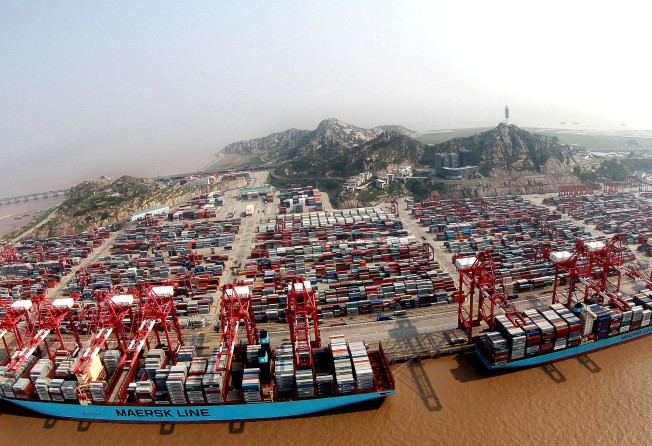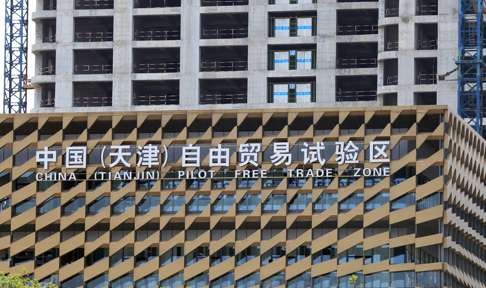Beijing further relaxes rules on foreign investment in FTZs
18 new measures introduced to allow easier access to companies

Beijing further relaxed restrictions on foreign investment in the mainland’s four free-trade zones (FTZs) on Tuesday, allowing freer market access in various manufacturing and service sectors, including the steel, auto batteries and shipping industries.
A document published by the State Council said 18 rules and regulations had been revised as a way of facilitating further development of the four areas, which are seen as testing grounds for China’s economic reforms.
The central government said the FTZs – in Shanghai, Guangdong, Tianjin and Fujian – would now adopt a registration-based process, rather than what many had considered a long-winded review-and-approval procedure, before giving any green light to overseas-funded projects.
However, the segments previously stipulated in the negative list on foreign direct investment (FDI) will still be off-limits to foreign investors at the free-trade zones, the document added.
Economic analysts said the new policies aimed at bolstering global investors’ in the FTZs following years of lacklustre operations.
“All the relaxation of the rules was supposed to take effect earlier since the government pledged to transform the free-trade zones into entirely free marketplaces,” said Shenwan Hongyuan Securities chief economist Li Huiyong. “The central government still appears to be resolute in deepening reforms and liberalisations in the zones.”
In late 2013, Beijing allowed Shanghai to establish the mainland’s first FTZ, hoping to transform it into a Hong Kong-style free port with full convertibility of yuan.
Early last year, the other three FTZs were set up as a way to accelerate the mainland’s integration into the global economy.
But the slow progress of the FTZ development has largely dented foreign businesses’ interest.
“Pledges to conduct drastic liberalisations at the free-trade zones have been seen as empty talks for a while,” said Zhu Dan, a deputy chairman of Zhangjiang Platform Economic Research Institute. “All eyes will be on the new policies to see whether they will effectively shore up investors’ confidence.”
In past years, foreign companies and chambers of commerce have complained of government bias against global players, in an effort to bolster home grown firms.
According to the document, overseas investors can also now use the profits from their existing businesses on the mainland to reinvest in FTZ-based operations without going through any new application procedure.
The new round of deregulation also reflects Beijing’s attempt to attract more foreign capital amid increasing pressure on a depreciating yuan.
In the overcapacity-troubled steel sector, foreign firms will no longer be subject to various qualification requirements and minority stake restrictions when investing in China, and will be allowed to set up wholly-owned plants in the FTZs.
The policy change comes a week after European manufacturers pressured European Union leaders at a bilateral summit in Beijing to take a tough stance with China on industrial overcapacity and the potential granting of market economy status to China later this year.
Thirty European industrial associations have accused Chinese manufacturers of dumping products, overbuilding production capacity and alleged Chinese central and local governments of giving “illegal” subsidies to manufacturers to expand capacities.
Despite China’s ranking as the world’s biggest consumer of steel and the home to the world’s biggest steel industry, foreign companies have only limited investment in a Chinese steel sector dominated by state-backed firms.
Firms including Europe’s ArcelorMittal and Japan’s Nippon Steel & Sumitomo Metal hold minority stakes in Chinese steel firms or joint ventures.
Argonaut Securities metals and mining analyst Helen Lau said the policy is likely aimed at longer term considerations, even as China grapples with its severe over-capacity problem in the steel industry.
“Ultimately China wants to attract foreign investment to set up highly efficient firms to produce higher-end steel products ... this could help force Chinese firms to become more competitive and drive badly needed industry consolidation,” she said, adding that the free trade zones may provide attractive tax regimes for investment.
Land restrictions in the four pilot free trade zones would suggest that foreign firms are more likely to set up high-end processed products like steel alloys instead of general products that require more space, she added.

The country’s massive steel industry has attracted limited international investment, and now dwindling domestic and international demand has left a huge global oversupply.
The new measures will allow overseas firms to set up solely-owned steel producers in the country for the first time, in the FTZs, the statement said.
The new round of deregulations reflect Beijing’s attempt to attract more foreign capital amid increasing pressure on a depreciating yuan.
In past years, foreign companies and chambers of commerce have complained of government bias against global players, in an effort to bolster homegrown firms.
In late 2013, Beijing allowed Shanghai to establish the mainland’s first FTZ, hoping to transform it into a Hong Kong-style free marketplace with a full convertibility of yuan.
Early last year, the other three FTZs were set up as a way to accelerate the mainland’s integration into the global economy.